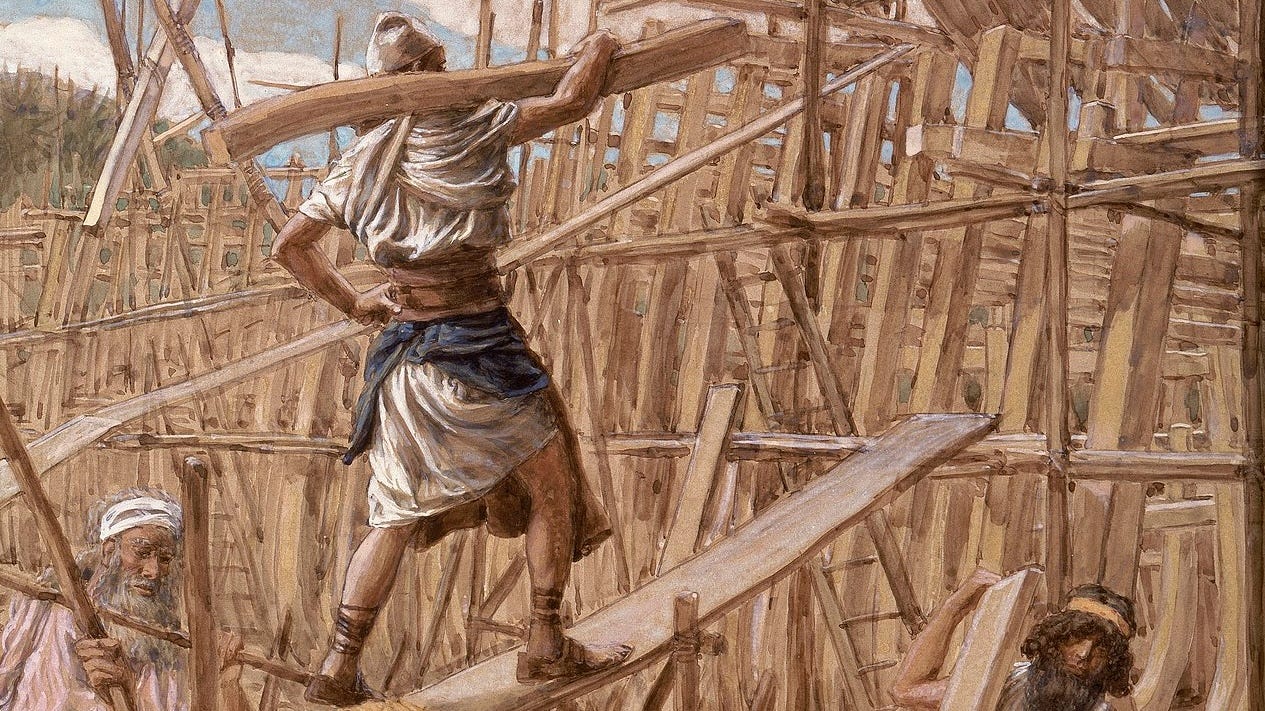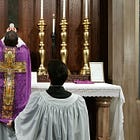Doomsday—'Watch, and be ready for your Lord to come'
At Christ's first advent in Bethlehem, few expected such a momentous event—and he compares the time before his second coming to Noah's days before the Flood.

At Christ's first advent in Bethlehem, few expected such a momentous event—and he compares the time before his second coming to Noah's days before the Flood.
Doomsday—Part V
In this passage, Fr Coleridge tells us:
How Christ compares the Last Day to the days before the Flood, highlighting the heedlessness of men despite warnings.
Why the good and the evil live side by side until the final judgment, when the righteous will be gathered and the wicked left to destruction.
What Christ teaches through parables about vigilance, readiness, and faithful stewardship in the face of uncertainty.
The Lord’s coming will be sudden, unexpected, and decisive—only those who watch and prepare will be saved.
Does it seem strange to be reading about the end of the world, and such watchfulness, on Christmas Eve?
No, it does not. Many men at the time of Christ’s birth missed what was happening. This could put us in mind of Our Lord’s words, to which Fr Coleridge refers in this passage:
‘But this know ye, that if the good man of the house knew at what hour the thief would come, he would certainly watch, and would not suffer his house to be broken open. Wherefore be ye also ready, because at what hour you know not the Son of Man will come.’
This ‘Doomsday’ series is a continuation of Fr Coleridge’s commentary on the Gospel of the First Sunday of Advent. Advent is often thought of as the start of the new liturgical year, but as we can see, this Gospel reading flows seamlessly from that of the last Sunday after Pentecost.
This is because Advent itself is not just ordered towards Christmas as the commemoration of Christ’s birth in the flesh, but also towards his Second Coming in Glory.
We have addressed some of the reasons for this, and how the Roman Liturgy presents this matter, below:
Doomsday for the World
From
Passiontide—Part I
Fr Henry James Coleridge, 1889, Ch. XIV, pp 281-8
St. Matt. xxiv. 29–36; St. Mark xiii. 24–34; St. Luke xxi. 25, 26;
Story of the Gospels, § 144, 5.
Sung on the First Sunday of Advent
The days of woe
‘And as in the days of Noe, so shall also the coming of the Son of Man be. For as in the days before the Flood, they were eating and drinking, marrying and giving in marriage, even till that day in which Noe entered into the ark, and they knew not till the Flood came, and took them all away, so also shall the coming of the Son of Man be.
‘Then two shall be in the field, one shall be taken and one shall be left. Two women shall be grinding at the mill, one shall be taken and one shall be left. Watch ye, therefore, because ye know not what hour your Lord will come.’
This comparison of the days just before the end of the world to the days before the Flood has been already made by our Lord at the time when He spoke to the Pharisees of the coming of the Kingdom of God.1
In that former passage, He added the days in Sodom before the destruction of the Cities of the Plain. The picture is one of thoughtless and fearless enjoyment. But we cannot doubt that there were many signs beforehand of the coming catastrophe, and, moreover, the ark was a hundred years in building, and Noe was probably a preacher as well as an example of penance.
The life of pleasure and heedlessness went on to the very day, He tells us, when Noe entered into the ark, and this is the pattern which will be followed by the majority of men before the Last Day.
That is one feature of the picture. Another is the mixture between the good and the evil, side by side, in the same place and occupation; two in the field, one taken, one left, two grinding at the mill, one taken, the other left. The taking and leaving has reference to the gathering together of the saints of God by the holy angels. Those that are left are those who are to be destroyed.
The day coming as a thief—and St Paul’s words
‘But this know ye, that if the good man of the house knew at what hour the thief would come, he would certainly watch, and would not suffer his house to be broken open. Wherefore be ye also ready, because at what hour you know not the Son of Man will come.’
We find an echo of these words, or rather of the substance of the teaching which they convey, in the first Epistle to the Thessalonians, written, as we have said, to some very recent converts:
‘Of the times and seasons, brethren, you need not that we should write unto you. For you yourselves know perfectly, that the day of the Lord shall so come as a thief in the night. For when they shall say, peace and security, then shall sudden destruction come upon them, as the pains upon her that is with child, and they shall not escape.
‘But you, brethren, are not in darkness, that that day should overtake you as a thief. For all you are the children of light and the children of the day, we are not of the night nor of darkness. Therefore let us not sleep, as others do, but let us watch and be sober. For they that sleep, sleep in the night, and they that are drunk, are drunk in the night.
‘But let us who are of the day, be sober, having on the breastplate of faith and charity, and for a helmet, the hope of salvation.’2
The sense of St. Paul is easily seen, but it is not fully drawn out, as the parable or image is not completed. The good man of the house does not wish his house to be broken open, and in order to prevent this, he watches, because he does not know when the thief may come.
The thief, on the other hand, seeks to find a time when the master of the house is not watching. Our Lord is coming to us, in an hour which we do not know. He does not come to us with any intention of plunder or injury, but it will be to our ineffable loss if He comes, not at a time which we know not—for this is inevitable—but at a time when we are not prepared, which will be fatal.
We are therefore to watch, and not let our house be broken into, by which He means that we are not to be taken unawares. Our house is to be open to our Lord, and to welcome Him with joy and thankfulness. His coming is to be as the day of deliverance, long expected and anxiously watched for.
In order to secure this, we are to live, as St. Paul says, as children of light, and of the day. The Apostle draws out the conclusion which will produce the disposition and the practice which becomes Christians, and in so doing he explains and comments on our Lord’s words. He seems to bid us not let those words come true in our case.
Servants waiting for the return of their lord
A few words which St. Mark has added to the declaration of our Lord about the hiddenness of the Last Day seem to carry on and explain St. Matthew’s words of which we have just been speaking, and which are omitted by St. Mark. No one knows, our Lord has said, the appointed day:
‘Take ye heed, watch and pray, for ye know not when the time is.’
And he gives another image instead of that of the good man of the house who will not let it be broken into:
‘Even as a man who, going into a far country, left his house, and gave authority to his servants over every work, and commanded the porter to watch. Watch ye, therefore, for ye know not when the lord of the house cometh, at even, or at midnight, or at the cockcrowing, or in the morning, lest coming on a sudden, he find you sleeping.’
This instruction, and, indeed, almost all that is contained in these paragraphs of the two first Evangelists, is a repetition of warnings which were also given by our Lord at an earlier time, and several of them are found in St. Luke’s account of our Lord’s teaching in Judea.3
The rest of this commentary is for members.
Here’s why you should subscribe to The Father Coleridge Reader:
Coleridge provides solid explanations of the entirety of the Gospel
His work is full of doctrine and piety, and is highly credible
He gives a clear trajectory of the life of Christ, its drama and all its stages.
If more Catholics knew about works like Fr Coleridge’s, then other works based on dubious private revelations would be much less attractive.
But sourcing and curating the texts, cleaning up scans, and editing them for online reading is a labour of love, and takes a lot of time.
Will you be a part of this project and hit subscribe?





